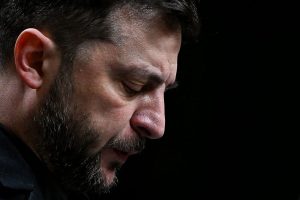On Christmas Eve 1914, British and German soldiers laid down their arms and crossed trenches to exchange gifts, bury the fallen and even play soccer — a brief, poignant truce amid the horrors of World War One. This week, Hungary’s Viktor Orbán has tried to emulate that spirit of goodwill by proposing a symbolic Christmas ceasefire and a prisoner exchange between Russia and Ukraine. He called Vladimir Putin, talked to him for an hour, and then teamed up with the Kremlin to pin the blame on Volodymyr Zelensky for rejecting a Christmas truce. So, what really happened?
A ceasefire is the last thing Putin wants right now
A heated exchange started after Zelensky slammed Orbán for discussing the war with Putin behind Ukraine’s back. He tagged the Hungarian prime minister on X and said: “We all hope that [Orbán] at least won’t call Assad in Moscow to listen to his hour-long lectures as well.” The Ukrainian president, in a restrained, diplomatic tone, has repeatedly criticized world leaders for dialing Moscow to serve their own agendas — leaders such as Germany’s Olaf Scholz, who called Putin last month to bolster his peacemaker image ahead of February’s elections. As for Orbán, Zelensky didn’t mince words; Ukrainians see him as Putin’s ally for obstructing EU aid for Kyiv, and there’s no pretending otherwise.
The Hungarian leader took offense, firing back that Zelensky had “clearly rejected” a Christmas truce, leaving out Putin’s response to this proposal. The Kremlin quickly issued a statement also shifting the blame on to Ukraine. But Zelensky couldn’t reject something he wasn’t aware of. Dmytro Lytvyn, his advisor, said the Hungarian side did not discuss anything with Kyiv. “As always, Ukraine hasn’t authorized Hungary to represent it in any way,” Lytvyn said, “We need real peace, not PR stunts, and solid security guarantees, not empty talk.” He added that Ukraine is holding talks for a major prisoner exchange by the year’s end and that Orbán has not been part of it.
A ceasefire is the last thing Putin wants right now. Up to 2,000 Russian soldiers a day are being injured or killed trying to push Ukrainians out of the Kursk region and capture as much land as possible before Donald Trump takes office. The sacrifice is paying off: Russian troops seized five times more territory last month (280 square miles) than the whole of last year, so why would he stop them?
The fate of Pokrovsk, the city in the Donetsk region that gave the world the melody from “Carol of the Bells,” is hanging by a thread. Pokrovsk’s gas supply was cut off yesterday, and Ukraine’s largest steel producer has halted operations at its coal plant as Russian forces approach (they are now just two miles away). A decade ago, Ukraine lost 80 percent of its coal deposits when Moscow occupied parts of the Donetsk and Luhansk regions, making Pokrovsk a main source of coking coal. When the city falls, Ukraine’s steel production will be halved, severely affecting its weapons manufacturing.
Russia will cease fighting and enter negotiations only if Kyiv accepts the “situation on the ground” and Putin’s terms outlined in June, according to Russia’s foreign ministry. Zelensky is asked to withdraw his troops from four Ukrainian regions that Putin couldn’t even capture entirely and abandon any plans to join NATO. All western sanctions must be lifted. Until these conditions are met — or until Trump finds a way to force Putin into talks — the fighting in the trenches and Russian missile attacks against war-weary Ukrainian civilians will continue, even as the rest of the world sings carols. Orbán is right only about one thing: these are, without a doubt, the most dangerous weeks of the war.


























Leave a Reply